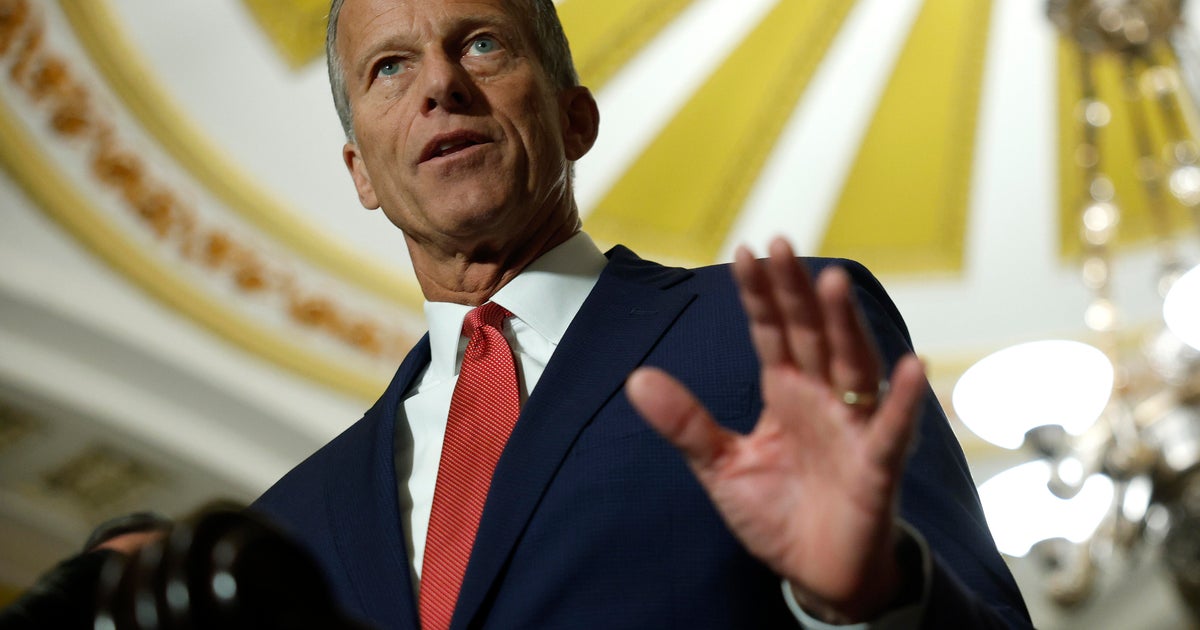

No response returned

Washington — Senate Republicans are expected to move Thursday on to make it easier to confirm President Trump's nominees amid a , who are warning against the move to go "nuclear."
For months, Republicans have criticized Democrats' efforts to slow the confirmation process, which they have taken to new extremes in recent months in protest to the president's policies. And after weeks of discussion among Senate Republicans, Senate Majority Leader John Thune kickstarted the rule change process earlier this week, announcing a proposal to consider non-cabinet executive branch nominees in groups.
"We've got a crisis, and it's time to take steps to restore Senate precedent and codify in Senate rules what once was understood to be standard practice, and that is the Senate acting expeditiously on presidential nominations to allow a president to get his team into place," Thune said as he announced he would take procedural steps to change the rules.
Thune, a South Dakota Republican, has touted the proposal as one with "a Democrat pedigree," citing a 2023 proposal to codify en bloc nominations of up to 10 nominees in Senate rules. Thune argued the GOP measure is "not as extensive," noting that it applies to subcabinet level nominees and not judicial nominees. "But the proposals share the same objective — and that is providing for confirming groups of nominees all together so the president can have its team in place and so the Senate can focus on the important legislative work in its charge."
The majority leader filed a Monday to authorize the "en bloc," or all at once, consideration of 48 nominees. On Thursday, the Senate is set to take a procedural vote on the resolution, which is expected to fall short of the 60-vote threshold needed to advance most measures in the upper chamber. Senate Republicans are then expected to move to overrule the chair, lowering the threshold to a simple majority.
Because the Senate often relies on unanimous consent to speed up floor consideration, any single senator can delay the process. And in recent years, both Democrats and Republicans have made pushes to change the confirmation process, including by cutting down the time requirements for the nominations and reducing the number of votes needed to a simple majority.
Still, Senate Minority Leader Chuck Schumer, a New York Democrat, has pushed back on the GOP effort, telling Senate Republicans to "think carefully before taking this step."
"If you go nuclear, it's going to be a decision you will come to regret," Schumer said.
The minority leader has repeatedly criticized the White House for before the August recess involving the release of already appropriated funds in exchange for cooperation from Democrats to swiftly approve a group of nominees. Schumer has said Democrats were working "in good faith with Republicans" on a nominations package, noting that Thune was very involved and seemed willing to come to an agreement, before Mr. Trump torpedoed the talks.
"Now, rather than giving those talks another chance, Republicans would rather change how the Senate operates to weaken this chamber's traditional and powerful sense of deliberation, Schumer said. "And if Republicans go nuclear, the historically bad nominees we've seen so far under Donald Trump will get only worse."
With more than 1,000 positions requiring Senate confirmation, the process is an arduous one that has become more cumbersome in recent years. According to the Center for Presidential Transition, the average time to confirm a president's nominee has nearly during the last six administrations.
In 2023, Democratic Sen. Amy Klobuchar of Minnesota and independent Sen. Angus King of Maine introduced a proposal that would have allowed up to 10 nominees reported by the same Senate to be quickly confirmed. Senate Republicans have repeatedly cited the legislation in recent days as they pursue their rule change, and Sen. John Cornyn, a Texas Republican, attempted to secure passage of a similar resolution on Tuesday under unanimous consent, saying "if Democrats were really interested in solving the problem… they wouldn't object, they would agree — it's their idea." But one Democrat, Sen. Alex Padilla of California, objected, suggesting the effort should take effect in the next administration.
King told TheNews that his and Klobuchar's legislation was intended for future administrations, saying "we designed that for the next president."
"That would take it out of the politics of the moment," King said. "Now, all of a sudden, they're dusting it off for use today."





